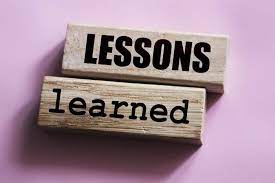The Value of Lessons in Learning and Growth
Lessons are the building blocks of knowledge and experience that shape our understanding of the world around us. Whether formal or informal, structured or spontaneous, lessons play a crucial role in our personal and professional development.
The Importance of Learning from Lessons
Lessons provide us with opportunities to acquire new skills, gain insights, and broaden our perspectives. They challenge us to think critically, solve problems creatively, and adapt to changing circumstances. Every lesson learned is a stepping stone towards personal growth and self-improvement.
Types of Lessons
Lessons come in various forms – from classroom lectures to hands-on experiences, from mentorship relationships to self-reflection exercises. Each type of lesson offers unique benefits and contributes to different aspects of our development.
The Role of Mistakes in Lessons
Mistakes are often seen as valuable lessons in disguise. They provide us with opportunities to learn from our errors, make corrections, and grow stronger. Embracing mistakes as part of the learning process allows us to approach challenges with resilience and determination.
Continuing Education through Lifelong Lessons
Learning does not end with formal education; it is a lifelong journey that involves continuous exploration and discovery. By remaining open to new lessons and experiences, we can stay adaptable, relevant, and engaged in a rapidly changing world.
Conclusion
Lessons are the threads that weave together the fabric of our knowledge, skills, and character. They serve as guideposts on our path towards growth and fulfilment. Embrace each lesson as an opportunity for learning, for it is through lessons that we evolve into our best selves.
Top 5 Tips for Effective Lesson Preparation and Participation
- Prepare for your lessons by reviewing previous materials.
- Actively participate in class discussions and activities to enhance learning.
- Ask questions if you don’t understand something – it shows engagement and helps clarify concepts.
- Take notes to aid retention and understanding of key points.
- Set aside dedicated time for studying outside of lessons to reinforce learning.
Prepare for your lessons by reviewing previous materials.
Preparing for your lessons by reviewing previous materials is a valuable tip that can significantly enhance your learning experience. By revisiting what you have already covered, you reinforce your understanding, identify any gaps in knowledge, and establish connections between new and existing information. This proactive approach not only helps you retain key concepts better but also enables you to engage more actively during the lesson itself, leading to a deeper comprehension and a more fulfilling learning journey overall.
Actively participate in class discussions and activities to enhance learning.
Actively engaging in class discussions and activities is a valuable tip for maximising the learning experience. By participating actively, students have the opportunity to share their perspectives, ask questions, and interact with their peers and instructors. This not only enhances understanding of the subject matter but also fosters critical thinking, communication skills, and collaborative learning. Through active participation, students can deepen their knowledge, gain new insights, and contribute to a dynamic and enriching educational environment.
Ask questions if you don’t understand something – it shows engagement and helps clarify concepts.
Asking questions when faced with uncertainty or confusion is a valuable practice in the learning process. By seeking clarification and further explanation, you demonstrate active engagement with the material and a genuine interest in understanding the concepts at hand. Not only does asking questions help to fill gaps in your knowledge, but it also fosters a deeper level of comprehension and retention. Embracing curiosity and being proactive in seeking clarification through questions can lead to a more enriching learning experience and a clearer grasp of complex ideas.
Take notes to aid retention and understanding of key points.
Taking notes is a valuable practice that enhances retention and understanding of key points during lessons. By actively engaging with the material through note-taking, you create a personalised reference that reinforces important concepts and aids memory recall. Organising information in your own words helps clarify complex ideas and allows for deeper comprehension. Additionally, reviewing your notes regularly can strengthen your grasp of the subject matter and improve your overall learning experience.
Set aside dedicated time for studying outside of lessons to reinforce learning.
Setting aside dedicated time for studying outside of lessons is a crucial tip to reinforce learning and deepen understanding. By allocating specific periods to review and practice what has been taught, students can solidify their knowledge, clarify any doubts, and apply concepts in different contexts. This proactive approach not only enhances retention but also cultivates a habit of continuous learning, empowering individuals to excel academically and professionally.
